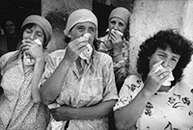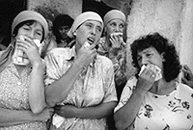|
|
| Kosovar
Albanian women of the Kabashi family mourn the deaths of four
of their family members, including a 6-month-old baby. They
found the bodies in two shallow graves not far from the family
home when they returned from exile in Albania. Photos
by Gary Knight |
As
the fighting intensified between the KLA and Yugoslav forces, a shroud
of distrust settled over Mala Krusha. No one said anything at first,
but it was as if the walls that separated the Serbian and Albanian
enclaves in the
village had grown thicker. Long past were the days when a Serb bride
might work her away across a crowded room to receive a hug from her
Albanian neighbors who had dropped in to congratulate her. Nor would
one see
an Albanian couple - the woman dressed in a black kerchief and flowing
shallvare trousers, her husband wearing the traditional conical hat
called a qeleshe - in the reception line at a Serb funeral. As always,
men from both groups waited every morning by the highway for the Kosovena
bus, but they no longer mingled, sharing gossip and cigarettes. Now,
long, uneasy silences punctuated their half-hour rides to the distillery.
Two days before NATO air strikes began, the owner of the Kosovena
winery dismissed all ethnic Albanian employees.
As
Qamil Shehu and his family fled through the village during the night
of NATO's first attacks, they were joined by dozens of other Albanian
families. Avoiding the center of town, where Serb housing was clustered,
they made their way up an old logging road and slipped into the woods
in the direction of a bluff that overlooks the village and the surrounding
valley. By daybreak, more than 300 villagers had gathered on the escarpment.
Fearful of lighting fires, women huddled together with their children
in their laps to keep warm, while the men stood near the edge of the
cliff, smoking and debating what to do next....
To
continue reading this article, click on the 'printer-friendly format'
below.
Summary of the remainder of the article:
War crimes investigations and trials alone cannot address the root
causes of communal violence, especially in a postwar country like
Yugoslavia where thousands of people – strangers and neighbors
alike – planned and carried out ethnic cleansing with impunity
and savagery. Trials can pierce the veil of denial and impunity, provide
acknowledgment and recogition to the victims. But, as we see from
the families' stories gathered here, more is needed to foster trust,
healing, and national reconstruction.
|



